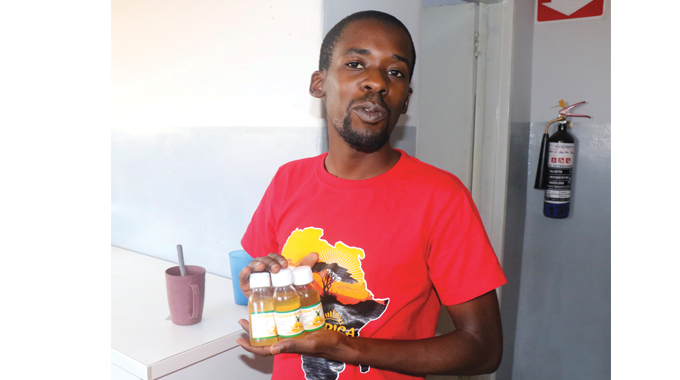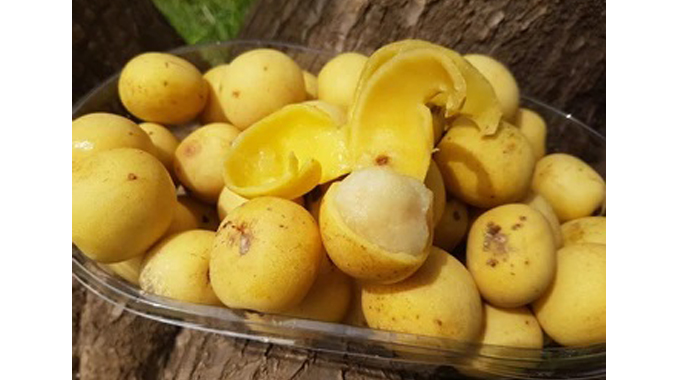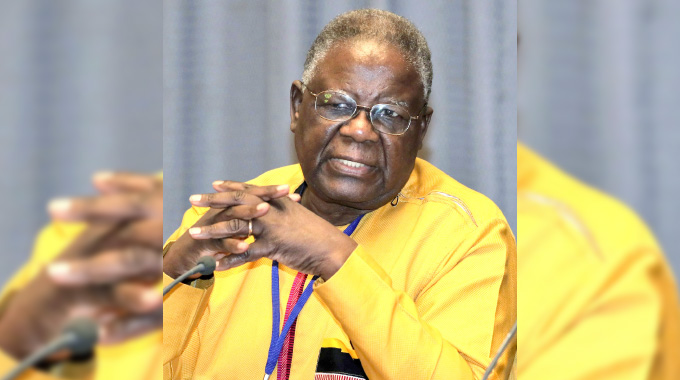Mapfura/marula — the new gold for Mwenezi folks…Processing plant gets overwhelming supply

Vincent Gono in Mwenezi, Features Editor
WHEN the talk of transforming rural livelihoods through sustainable alternatives that help communities build resilience by way of adding value to the natural resources abundant in their areas started, skeptics dismissed it as an ambitious political gimmick.
Government which is working hard to meet the National Development Strategy 1 (NDS1) targets, has however proved that it is not politicking when it urges communities to take advantage of their abundant resources to improve their livelihoods.
Mwenezi, one of the dry districts of Masvingo province is one of the areas that is already benefitting from its natural resources after National Biotechnology Authority of Zimbabwe built a mapfura/marula processing plant. The plant was commissioned by President Mnangagwa in October last year and communities in and around Rutenga growth point are already enjoying the fruits.

President Mnangagwa
They talk of mapfura/marula as their new gold with glowing faces as the project has started paying dividends with almost 900 villagers benefiting from the plant.
Mr Edison Nherera of Rutenga says the coming in of the mapfura processing plant transformed his life in a very short space of time.
“I got more than US$3 000 from the sale of mapfura at the plant. I sub-contracted other villagers who are far from here to harvest the fruit. I then organised transport to collect the harvested fruit. I used to pay the workers from my own pocket because I was guaranteed payment once I delivered the fruit to the plant. At first, I was using my own car but I realised it was giving me problems,” he said.
Mr Nherera said he was collecting the fruit from places as far as 20km away.
“I managed to buy cattle and opened a tuck-shop that I fully stocked. I fixed my car which had problems and now it’s moving and I am using it to do my orders. I also transformed where I live, bought furniture and well, I can say my family’s life improved greatly because of this mapfura business,” said Mr Nherera beaming with a smile.
He said he can’t wait for the mapfura season next year and hopes he will again benefit as he now has the knowledge regarding the logics to harvest and transport the fruit.
Chief Neshuro the plant has brought more joy in Mwenezi.
“We have witnessed a great transformation of people’s lives. This plant created employment for our youths. People are getting cash for deliveries of their product (mapfura) and that is what the President instructed. We have also witnessed a decline in cases of violence associated with a traditional brew from the same mapfura called mukumbi as people are taking mapfura to the plant as opposed to brewing beer,” said Chief Neshuro.

Mr Edison Nherera
He said the other advantage is that there is more appreciation and conservation of the mupfura tree than before as people are now deriving monetary benefits.
Chief Neshuro said in the past traditionally selected villagers would brew mukumbi that they would take to the chief and ask for permission to harvest the fruits to avoid a haphazard way of doing it.
Plant manager Engineer Noel Marimo said it was gratifying that their operations were more than what they expected and they were now looking at setting up a bigger plant that would meet the supply of mapfura.
“When we started, we expected to buy 17 tonnes of mapfura per season but we got an average of 30 tonnes per day. We got so overwhelmed on the supply side. The community was really forthcoming and we paid them cash. We paid US$5 for a 50kg of the premium quality fruit,” he said.
Eng Marimo said they bought 1 100 tonnes of mapfura/marula from only four wards.
He said they were now planning to expand the project with 100 hectares of land already identified.

mapfura/marula
Eng Marimo said the villagers had heeded President Mnangagwa’s call to use natural resources to improve their livelihoos.
The Second Republic is placing emphasis on innovation to achieve rural industrialisation.
Eng Marimo said at peak the plant employs 150 workers but when its off season, 50 employees remain.
Priority in terms of supplying the various finished products from the Rutenga plant will be given to the local market.
“We have 35 000 packaged units of marula wine that is ready for the market and we are targeting the local market,” said Eng Marimo.
He said they intend to export mainly the cosmetic oil made from the mapfura/marula nuts.
“We are in the process of drying mapfura/marula stones which we will then crack to get the nut.
“The nut is used in the production of an expensive cosmetic oil,” he said.
Eng Marimo added that they were working with ZimTrade in sourcing markets for their products that include but were not limited to marula jam, maheu and cereal porridge.

ZimTrade
He said they have also embarked on an ambitious afforestation programme where they are planting the rightful species of marula trees for improved quality of the juice.
“We are looking at giving 110 000 trees to partners including road construction companies such as Exodus and Bitumen that are operating in the district. We want them to help us plant the trees where they would have excavated in the process of doing the road. We are also looking at organising or clustering farmers who supply us with the mapfura/marula so that we register them and educate them on the standards we expect of the product,” he said.
The Rutenga processing plant is also eyeing processing other fruits like mangoes, guavas, oranges and water melons to produce juices and other items for local consumption and export.
Mapfura/marula are harvested from end of January to end of April and the fruit is abundant in Mwenezi, parts of Chivi and Chiredzi.
The plant, the first of its kind in Zimbabwe, processes and value adds the indigenous fruit to produce edible oils, juices, cosmetics oil and wines for both the local and export market among other items.
The mapfura/marula has improved the economic fortunes of ordinary villagers in Rutenga as they get disposable income from just picking and selling the fruit at the plant.











Comments